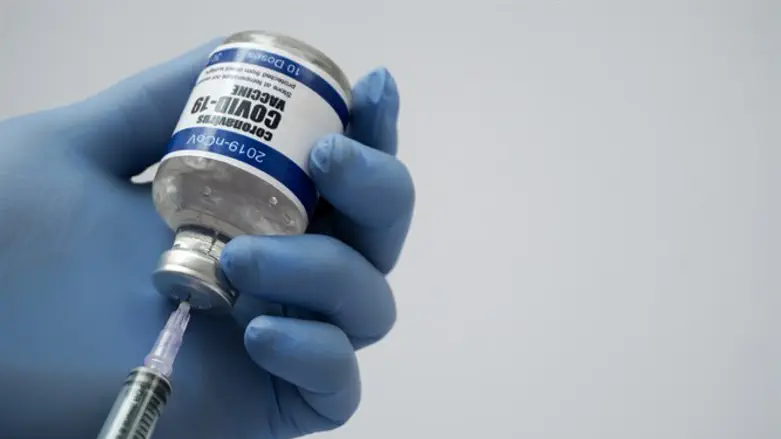
Over five million Israeli citizens have already been vaccinated against coronavirus, and if you’re not one of them, Hadassah Ein Kerem hospital is looking for you.
Hadassah’s clinical research unit is currently conducting stage-two trials of the coronavirus vaccine developed by the Israeli Biological Institute at Nes Ziona, but they are lacking around 100 volunteers to complete stage two. Anyone who wants to be part of this Zionist enterprise of developing a homegrown coronavirus vaccine can join the project, as long as he hasn’t contracted coronavirus in the past and hasn’t been vaccinated against it.
Arutz Sheva spoke with Prof. Yossi Karko, the director of the clinical research unit at Hadassah University Medical Center, to discuss the progress being made on the Brilife vaccine.
“We’re currently in the middle of phase-two trials,” Karko related. “Hadassah is one of several Israeli hospitals to be trialing the vaccine, which was developed by the Biological Institute in Nes Ziona. Trials began in November of 2020, and we’re now nearing the end of phase two out of three. The second phase is actually the most decisive one of all from our perspective, as its results will determine whether it’s worth continuing with the trial at all.”
Karko then described the stages of the research study in greater detail. “By the end of the second phase, around 1000 people will have been enrolled in the study. If the results of this stage indicate that the vaccine is effective, we will progress to the third and final stage, in which around 30,000 people will be enrolled and will be vaccinated with the Brilife vaccine. I can already predict that the third stage will present a great challenge for us to complete here in Israel, because most people here are already vaccinated or have recovered from the illness, which is why the third stage will most likely be conducted as an international study, in cooperation with Israeli researchers.”
Around 450 people have already been recruited by Hadassah hospital for phase-two trials, “and now we’re looking for another 100 people who haven’t been vaccinated and haven’t contracted coronavirus in the past. We’re especially interested in recruiting people who haven’t been vaccinated either because they didn’t get around to it, or because they were scared of getting vaccinated, or because they didn’t want to get the Pfizer or Moderna jabs [which are based on mRNA]. We are appealing to all such people to come forward and help us develop a homegrown vaccine, which has many advantages over the other vaccines currently available, because the whole world is chasing after a limited vaccine supply and what we want to do is have our own independent supply. If we end up needing to give additional doses, we really don’t want to be dependent on foreign sources of vaccines.”
How are volunteers selected? “The first contact with volunteers is made over the phone. We need to make sure you weren’t vaccinated and that you haven’t contracted the virus in the past. We also need to know if there’s any special reason preventing you from taking part in such a research study. Anyone who seems suitable will then be called in for a more extensive check-up which will determine whether or not the person is approved to join the study.
“Volunteers receive two doses of the vaccine, 28 days apart, and then we follow them up over a year, with monthly appointments at Hadassah hospital, each one lasting half an hour. Volunteers are paid 500 shekels per appointment.”
We asked Prof. Karko if Brilife’s side effects are comparable to those of other Covid-19 vaccines, some of which reportedly have severe side effects lasting up to a week or more for a large number of recipients. “Of the 800 people who have already received the Brilife vaccine (450 at Hadassah and the others at seven other medical centers), I can tell you that there are very few side effects indeed, and certainly in comparison to the vaccines produced by other companies. The worst side effects reported have been slight pain at the injection site which passes after a day or two. I would say that one of the main benefits of getting the Israeli vaccine shot as opposed to a foreign-made product is the lack of significant side effects.”
The professor then explained one reason why this could be. “The vaccine that has been developed in Israel is entirely different from what Pfizer and Moderna developed, as it is not based on genetic material. Rather, the Biological Institute took a virus that usually attacks animals and not humans, and manipulated it in such a way that it came to resemble the coronavirus. When we give this vaccine to humans, they don’t get sick from it, but their bodies do identify the spike protein of Covid-19 on the virus’ envelope and the immune system responds as if the coronavirus were attacking, and produces antibodies.”
Professor Karko then added a personal message to all those who are opposed on principle to being vaccinated against coronavirus. “I can assure you with a great level of certainty that our vaccine has the ability to cause the contagion rate in Israel to drop significantly, almost to the point that we won’t have any sick people.” With respect to other vaccines, Karko admitted that, “it’s true that we haven’t found the vaccine to protect against contracting the virus as much as we would have liked, and it also appears that the vaccine’s efficacy declines over time, which is why we have to give booster shots, as is the case with vaccines against other diseases.”
In conclusion, Karko again appealed for volunteers to come forward and “be part of this great program of developing our very own Israeli product, which will enable us to be self-sufficient in our ongoing battle against the coronavirus.”

